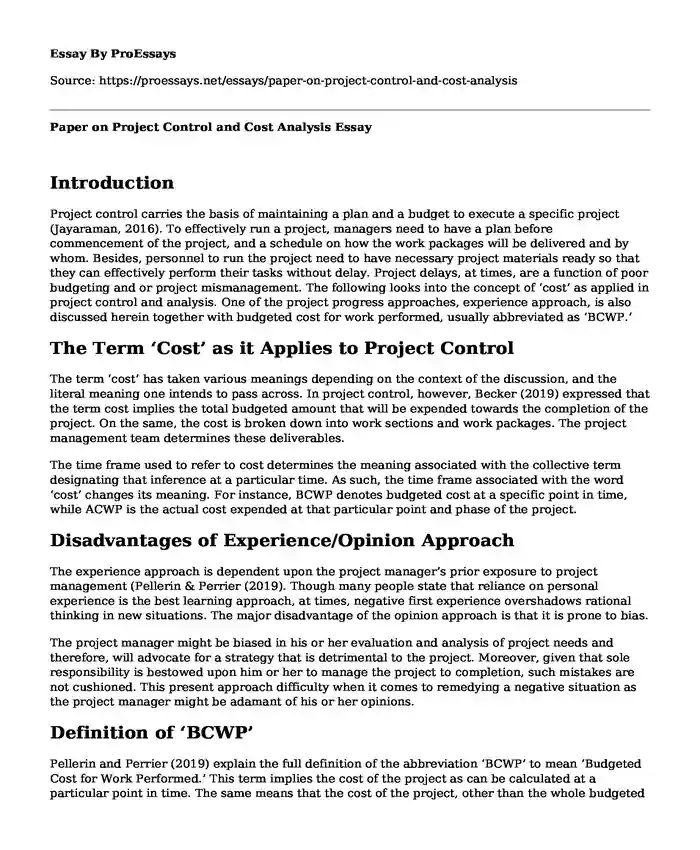Introduction
Project control carries the basis of maintaining a plan and a budget to execute a specific project (Jayaraman, 2016). To effectively run a project, managers need to have a plan before commencement of the project, and a schedule on how the work packages will be delivered and by whom. Besides, personnel to run the project need to have necessary project materials ready so that they can effectively perform their tasks without delay. Project delays, at times, are a function of poor budgeting and or project mismanagement. The following looks into the concept of ‘cost’ as applied in project control and analysis. One of the project progress approaches, experience approach, is also discussed herein together with budgeted cost for work performed, usually abbreviated as ‘BCWP.’
The Term ‘Cost’ as it Applies to Project Control
The term ‘cost’ has taken various meanings depending on the context of the discussion, and the literal meaning one intends to pass across. In project control, however, Becker (2019) expressed that the term cost implies the total budgeted amount that will be expended towards the completion of the project. On the same, the cost is broken down into work sections and work packages. The project management team determines these deliverables.
The time frame used to refer to cost determines the meaning associated with the collective term designating that inference at a particular time. As such, the time frame associated with the word ‘cost’ changes its meaning. For instance, BCWP denotes budgeted cost at a specific point in time, while ACWP is the actual cost expended at that particular point and phase of the project.
Disadvantages of Experience/Opinion Approach
The experience approach is dependent upon the project manager’s prior exposure to project management (Pellerin & Perrier (2019). Though many people state that reliance on personal experience is the best learning approach, at times, negative first experience overshadows rational thinking in new situations. The major disadvantage of the opinion approach is that it is prone to bias.
The project manager might be biased in his or her evaluation and analysis of project needs and therefore, will advocate for a strategy that is detrimental to the project. Moreover, given that sole responsibility is bestowed upon him or her to manage the project to completion, such mistakes are not cushioned. This present approach difficulty when it comes to remedying a negative situation as the project manager might be adamant of his or her opinions.
Definition of ‘BCWP’
Pellerin and Perrier (2019) explain the full definition of the abbreviation ‘BCWP’ to mean ‘Budgeted Cost for Work Performed.’ This term implies the cost of the project as can be calculated at a particular point in time. The same means that the cost of the project, other than the whole budgeted amount, is expended in bits. It is possible to value the project at any given point in time during the construction or delivery phases of the project. Also, ‘BCWP’ is sometimes used to mean the cost of the entire project, individual work packages, or tasks performed and accomplished by designated work deliverables and schedules. In practice, the budgeted cost of work performed is compared to the actual work delivered. This statement refers to the actual cost of the project at a particular point, and the same is compared to the budgeted cost that was earlier estimated.
References
Becker, P. (2019). Basics Project Control. Birkhäuser.
Jayaraman, R. (2016). Project cost control: A new method to plan and control costs in large projects. Business Process Management Journal, 22(6), 1247-1268. https://doi.org/10.1108/BPMJ-10-2014-0102
Pellerin, R., & Perrier, N. (2019). A review of methods, techniques and tools for project planning and control. International Journal of Production Research, 57(7), 2160-2178. https://doi.org/10.1080/00207543.2018.1524168
Cite this page
Paper on Project Control and Cost Analysis. (2024, Jan 10). Retrieved from https://proessays.net/essays/paper-on-project-control-and-cost-analysis
If you are the original author of this essay and no longer wish to have it published on the ProEssays website, please click below to request its removal:
- Lab on IT Risk Management
- Application of Statistical Concepts in Decision Making and Problem Solving
- Progress of Each Team Member and the Overall Team Paper Example
- Women in Organizations: The Glass Ceiling Essay Example
- The McKinsey 7-S Model Paper Example
- Baking Supplies Cost Estimate: Dinerstein's Prices Essay Example
- Project Management: Comp. UG Sprinkler Sys & Stakeholder Management - Essay Sample







